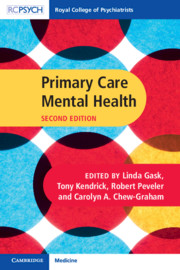Book contents
- Primary Care Mental Health
- Primary Care Mental Health
- Copyright page
- Contents
- Contributors
- Preface
- Section 1 Conceptual Basis and Overarching Themes
- Section 2 Clinical Issues
- Section 3 Policy and Practice
- Chapter 25 Public Mental Health
- Chapter 26 The Role of the Primary Care Team
- Chapter 27 Improving Access to Care
- Chapter 28 Collaborative Care and Stepped Care
- Chapter 29 Psychological Therapies
- Section 4 Reflective Practice
- Index
- References
Chapter 29 - Psychological Therapies
from Section 3 - Policy and Practice
Published online by Cambridge University Press: 10 September 2018
- Primary Care Mental Health
- Primary Care Mental Health
- Copyright page
- Contents
- Contributors
- Preface
- Section 1 Conceptual Basis and Overarching Themes
- Section 2 Clinical Issues
- Section 3 Policy and Practice
- Chapter 25 Public Mental Health
- Chapter 26 The Role of the Primary Care Team
- Chapter 27 Improving Access to Care
- Chapter 28 Collaborative Care and Stepped Care
- Chapter 29 Psychological Therapies
- Section 4 Reflective Practice
- Index
- References
- Type
- Chapter
- Information
- Primary Care Mental Health , pp. 420 - 438Publisher: Cambridge University PressPrint publication year: 2018

